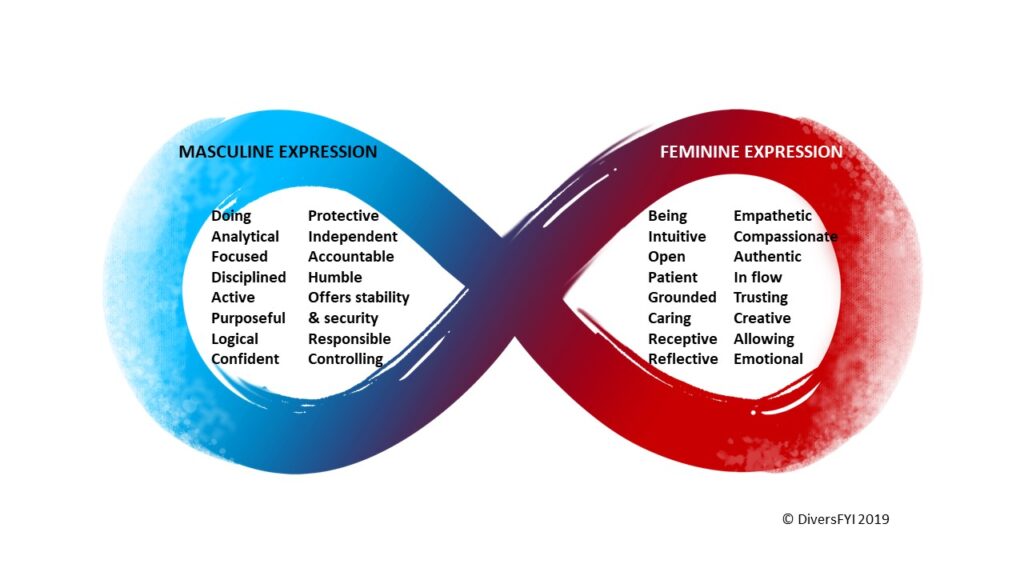How much feminine expression does your company culture allow?

Date: 15 November 2019 | Author: Edina de Jong – Hodzic
In my previous blogs I have addressed employees on their role and responsibility in the diversity discussion guided by the key principle ‘if you want to change something on the outside, you need to start the change on the inside’.
Now I would like to address the companies, organisations and institutions on their role in the diversity discussion. What is your role? How can you create environments where everyone feels seen, heard and valued for it’s unique contribution?
Let’s first take a look at today’s companies cultures. Majority of company cultures are influenced by ‘invisible’ rules and beliefs e.g. ‘network with the right people and you will progress in your career’. Although we pretend to have a lot of freedom in the way we shape our careers, in reality there is an ‘invisible’ force directing us. If we choose not to follow it because it doesn’t represent our unique and authentic expression, the chances are that we will be categorised as ‘average potential’ or ‘low ambition’ and this will in time limit our career. Could the same be happening within the diversity topic where the spell of ‘invisible’ rules and beliefs is limiting the expression of our uniqueness?
It’s important to bring awareness to these ‘invisible’ rules and beliefs that are shaping most of company cultures today.
If we look at the ‘visible’ systems and procedures that are holding the culture together, they often originate from the belief that ‘success needs to be defined in a uniform way in order to create fairness’. The intention is good, though by creating a uniform definition of success we automatically disregard individual definitions of success. Everyone has a unique definition of success and when one can’t express it’s uniqueness, it’s true potential is equally limited in it’s expression. This could lead to symptoms of underperformance, anxiety, stress and burn-out.
In todays world we define success through different KPIs (Key Performance Indicators) that are addressing ‘WHAT’ e.g. sales, product innovations, employee satisfaction etc. The nature of KPIs is that they must be measurable. I will refer to this ‘lineair’ perspective as ‘masculine expression’. By putting a strong focus on masculine expression, this automatically means that there is limited room for feminine expression. And I don’t mean this in the way of genders but as in that each one of us has both masculine and feminine expression within themselves varying in degrees unique to that person. For example, a woman can embody 50% masculine and 50% feminine energy but if one of the two is supressed – an imbalance occurs in both the body and the mind.
Throughout my corporate career I’ve seen cases where a Manager is being ‘assessed’ for partly making her/his targets according to the KPI definition (WHAT) while ignoring the fact that she/he has contributed in other ways (HOW), by expressing their uniqueness through building a safe team atmosphere, making decisions based on intuition, sharing wisdom with others openly, being compassionate towards others – examples of feminine expression (which can be expressed through both genders).
Because something is harder to measure, would that be a reason not to do it? Most employees that I talk to today feel very limited by this ‘uniform’ way of assessing performance because it completely takes out the human element. Is that what we want for the new generations?
The truth is that diversity is all about restoring the balance of masculine and feminine expression by integrating both in the way we are being and doing. By doing that we create a healthy base for everyone to express their true nature. Some will express more masculinity and others more femininity and that is all fine. What we see today, is that expressing femininity is not seen as something of value and naturally by expressing it one will not progress in a masculine environment. That’s the reason why we see a lot of men and women in high positions expressing significantly more masculine energy because that is what is expected from them in order to have success. I wonder if in both cases a predominantly masculine expression is their true authentic expression? The secret of everything in the universe is BALANCE so on this note, we can conclude that balancing both masculine and feminine energies in each individual is key to sustainable success in both company results and people fulfilment.
A collective way of addressing the topic of diversity is to look at the values that the company is expressing. Are they balanced in terms of masculine and feminine energy?
See below a list of masculine and feminine traits to scan within your environment and bring awareness to your Management team(s) about the imbalance that you observe.

